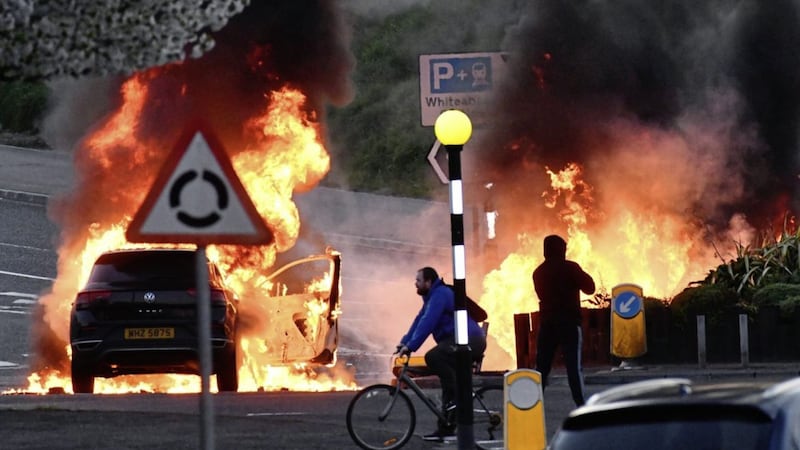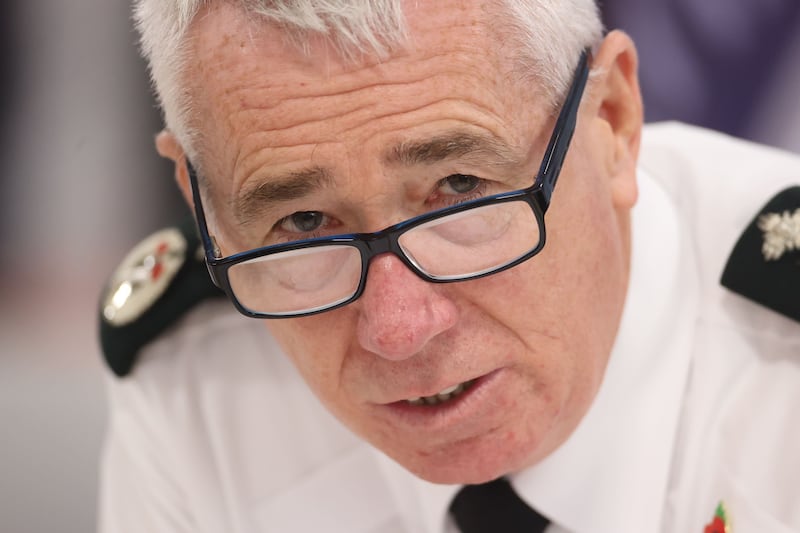The Policing Board "would expect" the chief constable to speak to all senior politicians, the board's chairman has said following DUP leader Arlene Foster's refusal to engage with Northern Ireland's most senior PSNI officer.
At a private meeting of the oversight board yesterday afternoon, all political and independent members called for an end to recent violence which has seen more than 40 officers hurt in riots in Belfast, Derry, Ballymena and Newtownabbey over Easter.
Several board members also expressed support for Chief Constable Simon Byrne, who has faced calls from unionist leaders, particularly the first minister, to resign over the policing of veteran republican Bobby Storey's funeral in June last year.
Following the meeting, Policing Board Chair Doug Garrett said greater leadership was needed.
He said although it was up to "individual parties" who they talk to it was "very important that we have dialogue at all levels".
"Our entire board today agreed that it was important to ensure that calm was called for, tensions were removed, dialogue with the community," he said.
He said a senior politician's refusal to talk to police was "not an ideal position".
"We would seek dialogue at all levels," he told the BBC.
"I would expect the chief constable to speak to all leaders and senior representatives."
In a earlier statement, Mr Garrett said the board welcomed recent arrests but was concerned that so many young people, including children as young as 12, had been drawn into violence.
"At this time, there must be a redoubling of efforts to calm tensions and for continued dialogue between the community and police officers at all levels of the PSNI," he said.
"Nothing is achieved without talking, and leadership is needed from all those with influence so that any concerns can be addressed through the democratic structures in place; and through the Board mechanisms for policing oversight and accountability.
"Now is the time for all to voice support for policing and reject the lawlessness witnessed over recent days."
SDLP MLA Dolores Kelly, who sits on the board, said the chief constable gave a written briefing on the recent violence during a "polite meeting".
"The Policing Board exists to take the politics out of policing and Arlene is trying to wrestle her way back in," she said.
"The board was unanimous in condemning the violence and support for policing. A number of members expressed their support for the chief constable and the senior (policing) team."
Ulster Unionist leader Steve Aiken said Mrs Foster is wrong to refuse to meet the chief constable.
"I have issues with the chief constable because of past actions and decisions, but that should not be the cause for us to refuse to engage," he said.
"He is the head of the Police Service of Northern Ireland and while he is in post, we should continue to work with him and all his officers."
DUP MP Gregory Campbell said violence could be used as an "excuse" to keep Mr Byrne in post.
"If people use their heads, and think ahead, and say we're not going to give people the opportunity to say a chief constable can't stand down because of the threat of violence," he said.
"That is something that would have a resonance across the community - don't give them that excuse. They should think long and hard in taking part in any protests that could eventually result in violence and serious hurt being done to individuals as well as to the wider community."








